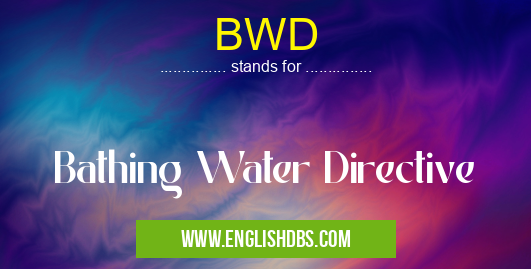What does BWD mean in UNCLASSIFIED
BWD stands for Bathing Water Directive. It is a European Union (EU) directive that sets standards for the quality of bathing water at beaches, lakes, and rivers. The BWD was first adopted in 1976 and has since been revised several times. The most recent revision was adopted in 2006.

BWD meaning in Unclassified in Miscellaneous
BWD mostly used in an acronym Unclassified in Category Miscellaneous that means Bathing Water Directive
Shorthand: BWD,
Full Form: Bathing Water Directive
For more information of "Bathing Water Directive", see the section below.
Purpose
The purpose of the BWD is to protect human health by ensuring that bathing water is clean and safe. The directive sets standards for the following parameters:
- Microbiological parameters: These parameters measure the presence of bacteria and other microorganisms that can cause illness.
- Physical parameters: These parameters measure the clarity and color of the water.
- Chemical parameters: These parameters measure the presence of chemicals that can be harmful to human health.
Compliance
EU member states are required to comply with the BWD by monitoring their bathing waters and taking action to improve water quality where necessary. Bathing waters are classified into one of four categories:
- Excellent: Meets all of the BWD standards.
- Good: Meets most of the BWD standards.
- Sufficient: Meets some of the BWD standards.
- Poor: Fails to meet the BWD standards.
Essential Questions and Answers on Bathing Water Directive in "MISCELLANEOUS»UNFILED"
What is the Bathing Water Directive (BWD)?
The BWD is a European Union directive that sets standards for the quality and management of bathing water in the EU, to protect human health and the environment.
What types of water bodies does the BWD cover?
The BWD covers all surface waters used for bathing, including beaches, lakes, rivers, and estuaries.
How does the BWD ensure water quality?
The BWD establishes limits on the concentration of microorganisms (such as bacteria) and other substances in bathing water. Member states must monitor bathing water regularly and take appropriate measures to keep it clean.
What are the benefits of the BWD?
The BWD has improved the quality of bathing water in the EU, reducing the risk of waterborne illnesses and protecting public health. It also supports tourism and recreation by making bathing areas more attractive and safe.
What happens if a bathing water body fails to meet BWD standards?
Member states must take action to improve the water quality and inform the public about the situation. This may involve measures such as pollution control, beach closures, or advisories against bathing.
How can the public contribute to maintaining good bathing water quality?
The public can help by following responsible practices at bathing areas, such as not littering, using designated waste disposal facilities, and disposing of pet waste properly. They can also support awareness campaigns and advocate for clean bathing water.
Final Words: The BWD is an important piece of legislation that helps to protect human health by ensuring that bathing water is clean and safe. The directive sets standards for the quality of bathing water and requires EU member states to comply with these standards.
BWD also stands for: |
|
| All stands for BWD |
